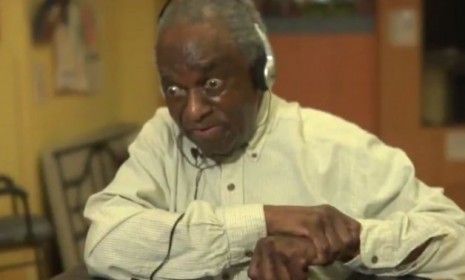How music improves the memory of dementia patients
Millions of elderly Americans suffer from Alzheimer's. And listening to tunes from their salad days could help them unearth old memories — and make new ones

A free daily email with the biggest news stories of the day – and the best features from TheWeek.com
You are now subscribed
Your newsletter sign-up was successful
Henry Dryer, a 92-year-old who suffers from dementia and has been in a nursing home for 10 years, loves listening to music. It energizes him, makes him more talkative, and even helps him remember the old days when he would play Cab Calloway records. Dryer's story is featured in a new documentary, Alive Inside, which debuts April 18 in New York City's Rubin Museum. The film follows seven patients who have "come alive" thanks to Music & Memory, a nonprofit organization that donates iPods with personalized music to people with dementia. About 5.4 million Americans suffer from Alzheimer's, the disease that most often causes dementia, and recent studies have shown that music can improve memory and even help dementia patients develop new memories. Here's what you should know:
How does the music affect patients?
Before Dryer started using his iPod, he could only answer yes-or-no questions — and sometimes he sat silently and still for hours at a time. But now that he listens to music regularly, he can sing songs, carry on brief conversations, and even recall things from years ago. (See Henry dance in the video below.) Music "gives me the feeling of love, of romance," he says.
The Week
Escape your echo chamber. Get the facts behind the news, plus analysis from multiple perspectives.

Sign up for The Week's Free Newsletters
From our morning news briefing to a weekly Good News Newsletter, get the best of The Week delivered directly to your inbox.
From our morning news briefing to a weekly Good News Newsletter, get the best of The Week delivered directly to your inbox.
Why does music help dementia patients?
"Music imprints itself on the brain deeper than any other human experience," says renowned neurologist Oliver Sacks, who appears in the film. Pairing music with everyday tasks such as having a brief chat or taking medicine can help patients develop a rhythm they can use later to recall the memory of that conversation or medicine. But it's not just patterns and rhythms — music also taps into the brain's emotional centers. "Music evokes emotion, and emotion can bring with it memory... it brings back the feeling of life when nothing else can," says Sacks.
Does it matter what kind of music patients listen to?
It seems to. Music & Memory has had the most success with music that patients already like. Dryer's favorite music includes tunes by Cab Calloway and Bing Crosby.
A free daily email with the biggest news stories of the day – and the best features from TheWeek.com
Is there research to back this up?
Yes. A 2010 study by Boston University researchers found that Alzheimer's patients who completed a series of memory tests "learned more lyrics when they were set to music rather than just spoken." A similar study from Northwestern University in 2011 found that older people who have had musical training sometime in their lives "excel in auditory memory."
See for yourself:
Sources: ABC News, BU Today, Huffington Post, Mother Nature Network, Science Daily
-
 The ‘ravenous’ demand for Cornish minerals
The ‘ravenous’ demand for Cornish mineralsUnder the Radar Growing need for critical minerals to power tech has intensified ‘appetite’ for lithium, which could be a ‘huge boon’ for local economy
-
 Why are election experts taking Trump’s midterm threats seriously?
Why are election experts taking Trump’s midterm threats seriously?IN THE SPOTLIGHT As the president muses about polling place deployments and a centralized electoral system aimed at one-party control, lawmakers are taking this administration at its word
-
 ‘Restaurateurs have become millionaires’
‘Restaurateurs have become millionaires’Instant Opinion Opinion, comment and editorials of the day